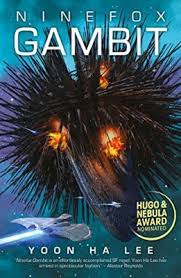Clarke Award Shortlist 2017 Part 3 : Sufficiently Advanced Mathematics
Occupy Me – Tricia Sullivan
Ninefox Gambit – Yoon Ha Lee
Sufficiently advanced mathematics being, of course, indistinguishable from magic, and that’s the thread I’m using to link these two books – very different in their settings and trappings but united by a core where reality is subject to manipulation in ways that frankly twist the mind.
 Tricia Sullivan is a SF author of considerable repute, with Occupy Me her fourth visit to the Clarkes shortlist (having, I believe, won it in 1999 with Dreaming in Smoke). This is a book about time, space, energy and angels, and it’s going to be relatively difficult to talk about because finding out what is actually going on is one of the chief pleasures of the book. The plot effectively starts in the middle and then unfolds towards the beginning and the end simultaneously, and that is entirely appropriate for the sort of physics that is flying around in the plot. Flying, in fact, is a major theme. One of the major viewpoints is from an angel, or at least an interdimensional entity that manifests as an angel (I was very much put in mind of Robson’s excellent Living Next Door to the God of Love, another Clarke’s shortlistee). She has been “hijacked” from her native reality/plane/dimension and dumped on earth with only the loosest idea of what she is for, save for helping people and lifting and carrying heavy things, and she is on the trail of the individual/entity who jumped her to earth because he still has her higher-dimensional kit that she needs to get back to… wherever or whatever it was she came from.
Tricia Sullivan is a SF author of considerable repute, with Occupy Me her fourth visit to the Clarkes shortlist (having, I believe, won it in 1999 with Dreaming in Smoke). This is a book about time, space, energy and angels, and it’s going to be relatively difficult to talk about because finding out what is actually going on is one of the chief pleasures of the book. The plot effectively starts in the middle and then unfolds towards the beginning and the end simultaneously, and that is entirely appropriate for the sort of physics that is flying around in the plot. Flying, in fact, is a major theme. One of the major viewpoints is from an angel, or at least an interdimensional entity that manifests as an angel (I was very much put in mind of Robson’s excellent Living Next Door to the God of Love, another Clarke’s shortlistee). She has been “hijacked” from her native reality/plane/dimension and dumped on earth with only the loosest idea of what she is for, save for helping people and lifting and carrying heavy things, and she is on the trail of the individual/entity who jumped her to earth because he still has her higher-dimensional kit that she needs to get back to… wherever or whatever it was she came from.
The second major narrative tells the story of her apparent nemesis, or rather the human doctor whom that nemesis sporadically possesses to do things like, inter alia, steal angels. His life is entangled with that of a phenomenally rich oil baron and crook whose money seems key to whatever the possessing force wants to accomplish, and all of this is complicated by the fact that the possessor appears to be an alternate world version of the possessee. And there are dinosaurs and whole lot of other strangeness which, as noted, the readers really needs to discover for themselves – suffice to say, when you do find out what’s going on, it’s ingenious and (imho) very satisfying. The two main viewpoints are nicely bound together by using first person for the angel, second person for the other (so in effect the angel speaking to doctor telling him what he’s doing, I think).
Occupy Me is definitely high concept, perhaps the most of the whole list (and being higher concept than Ninefox Gambit takes some doing). The two central characters, though opposed to each other, are entirely sympathetic, and the angelic messenger is an intriguing look at something human-like but inhuman, cognitively limited by her construction and remnants of her inbuilt purpose and trying to make her way in the world despite the gaping holes in her memory. There are some scenes, where everything is coming from her skewed perspective, where the reader is left to imagine all manner of horrors that she might simply be overlooking. All in all, it’s a complex but rewarding read.
 I first heard of Ninefox Gambit via Ed Fortune on the Brave New Worlds podcast, who gave it a particularly rave review. Subsequently, like the Chambers, it found its way to the Hugos shortlist and has attracted a great deal of critical attention. Ninefox is Lee’s first novel, the start of the Hexarchate series.
I first heard of Ninefox Gambit via Ed Fortune on the Brave New Worlds podcast, who gave it a particularly rave review. Subsequently, like the Chambers, it found its way to the Hugos shortlist and has attracted a great deal of critical attention. Ninefox is Lee’s first novel, the start of the Hexarchate series.
As I’ve been making comparisons, should I call Ninefox something like Ancillary Justice meets Quantum Thief by way of Warhammer 40,000? Probably not, because it has more going on than that might suggest, but I was put in mind of all three while reading. Lee gives us a far future space opera complete with a vast and complex empire (the titular Hexarchate, formerly the Heptarchate) that has a particularly original reason for wanting to impose its cultural norms on all and sundry. The Hexarchate relies on complex advanced mathematics to make its technology work, and specifically it requires everyone to be (literally) singing from the same hymn sheet – the same calendar, the same rituals, everyone acting in prescribed ways in order to bend the universe of numbers into a shape that permits their tech to flourish. When heretics arise and start using their own calendar, everything in that part of space gets thrown out of whack, and all the fancy toys don’t work properly. And the Hexarchate sends in the troops to stomp everything back into its proper alignment.
Cheris is one of those troops, part of the Kel, the warrior caste whose inspiring totem is the “suicide hawk”, which gives you a good idea of just how they tend to get used (very 40K, that bit). Being a Kel with an unusual gift for maths she ends up in charge of an assault on a heretic fortress guarded by impregnable “invariant” shields (i.e. shields that are not reliant on a given calendrical system). Or, rather, not quite in charge, because she is more properly the host of the arch-traitor undead general Shuos Jedao, whose resurrected tactical genius is just what the Hexarchate needs to crack the fortress. But Jedao is famously murderously insane, and now he’s inside Cheris’s head.
This all sounds particularly grim so the big surprise here is just how much sheer fun this book is. It clips along at a fast pace and delivers everything you could want out of a military naval SF adventure whilst also presenting one of the most original SF settings I’ve come across (I’m going to throw Dune into the mix as well, but only if the Empire in Dune was run entirely by Mentats and Navigators). The universe is presented in sufficient detail to promise that there’s a great deal more to learn than the first book shows, and, like Chambers, doesn’t feel that just because its characters are rushing around in spaceships, they can’t also have hobbies or watch bad duelling romances. There is a lot of chemistry between Cheris and Jedao, because he’s terribly urbane and witty and at the same time the fact of his true nature is right there like Cheris’s shadow, all the time, and Cheris is simultaneously on guard against him and learning from him. I also particularly liked the Servitors, the ubiquitous animal-form robots that keep everything running, with which Cheris has a somewhat illicit friendship (they reminded me very strongly of Crow and Tom Servo from MST3K). There is also – as with many space empire stories focusing on a single individual – the question of just how much we should be rooting for the Hexarchate, whose universe-bending calendar includes the ceremonial torturing of heretics as a necessary element…(1) Ninefox Gambit has gone right onto my list of books where I’m going to grab the sequel as soon as I have the chance.
So: wrapping up, six eminently worthy nominees, and we’ll have to wait until July for the winner. It’s a profoundly tough choice, to be honest (and I’m leery of making any personal bets because my record on such things is terrible). They are all, though, terribly good and, despite my hamfisted lumping them in pairs, all very different, covering a broad slice of what makes SF such a fun genre.
(1) Which gives us a view into the mind of the Hexarchate, really: a system which cannot tolerate heresy without falling apart, and yet which requires a constant supply of heretics…
 © 2008-2025 Pan Macmillan
© 2008-2025 Pan Macmillan
I loved Ninefox Gambit, and maths is usually a pretty big turnoff for me. But so much fun! I'll definitely check out Occupy Me.
You probabaly know, but there's a great short story on Tor.com set in the same universe with Jedao as a main character called 'Extracurricular Activities' that's even more fun than Ninefox Gambit. If that's possible.